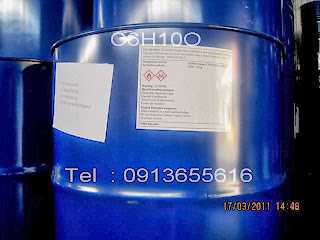Cyclohexanone
Cyclohexanone
Cyclohexanone is the organic compound with the formula (CH2)5CO. The molecule consists of six-carbon cyclic molecule with a ketone functional group. This colorless oil has an odor reminiscent of peardrop sweets as well as acetone.
Over time, samples assume a yellow color due to oxidation.
Cyclohexanone is slightly soluble in water, but miscible with common
organic solvents. Billions of kilograms are produced annually, mainly as
a precursor to nylon.[5]
Production
Cyclohexanone is produced by the oxidation of cyclohexane in air, typically using cobalt catalysts:[5]- C6H12 + O2 → (CH2)5CO + H2O
- C6H5OH + 2 H2 → (CH2)5CO
Uses:
The great majority of cyclohexanone is consumed in the production of precursors to Nylon 6,6 and Nylon 6. About half of the world's supply is converted to adipic acid, one of two precursors for nylon 6,6. For this application, the KA oil (see above) is oxidized with nitric acid. The other half of the cyclohexanone supply is converted to the oxime. In the presence of sulfuric acid catalyst, the oxime rearranges to caprolactam, a precursor to nylon 6:[5]
Cyclohexanone is the organic compound with the formula (CH2)5CO. The molecule consists of six-carbon cyclic molecule with a ketone functional group. This colorless oil has an odor reminiscent of peardrop sweets as well as acetone.
Over time, samples assume a yellow color due to oxidation.
Cyclohexanone is slightly soluble in water, but miscible with common
organic solvents. Billions of kilograms are produced annually, mainly as
a precursor to nylon.[5]
Production
Cyclohexanone is produced by the oxidation of cyclohexane in air, typically using cobalt catalysts:[5]- C6H12 + O2 → (CH2)5CO + H2O
- C6H5OH + 2 H2 → (CH2)5CO
Uses:
The great majority of cyclohexanone is consumed in the production of precursors to Nylon 6,6 and Nylon 6. About half of the world's supply is converted to adipic acid, one of two precursors for nylon 6,6. For this application, the KA oil (see above) is oxidized with nitric acid. The other half of the cyclohexanone supply is converted to the oxime. In the presence of sulfuric acid catalyst, the oxime rearranges to caprolactam, a precursor to nylon 6:[5]
Cyclohexanone
https://blogger.googleusercontent.com/img/b/R29vZ2xl/AVvXsEh1LjRtCzWdSnxrMLwnwR1baBin-XjrQHOLhaPve_fY0GdU_omsh9phSybD_e6aeyE9bZN8monf9rh_eI1-jpXfYzbLySdKqKcnxEzhAa4QwkWyOBUSFUgOwc1owomX3lW5MBDBJZEU6Nw/s72-c/CYCLO_TAIWAN.JPG





